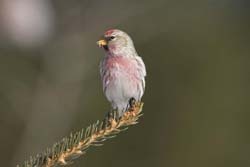Avian Salmonella - The Facts
Avian Salmonella: To Feed or Not to Feed?
What is Avian Salmonella?
Avian Salmonella is caused by a bacteria and is an uncommon cause of mortality in feeder birds. Occasionally, outbreaks of the disease cause significant mortality in certain species including Pine Siskin, Common Redpoll, and American Goldfinch.
What should I look for at my feeders?
Sick birds may appear thin or fluffed up and may have swollen eyelids. They are often lethargic and are easy to approach.
How is Avian Salmonella spread?
Salmonellosis is sometimes transmitted by fecal contamination of food and water by sick birds, though it is primarily transmitted by bird-to-bird contact during daily interactions and while roosting.
What should I do to keep my birds safe?
- If you are not seeing any birds with symptoms, continue to feed your birds, but with extra diligence in keeping your feeders and feeding area clean.
- If feeder birds are exhibiting disease symptoms (lethargic, puffed up, swollen eyelids), then remove your feeders and clean them.
- Scrub all your bird feeders, bird baths and hardware with soap and water, then sanitize with a 10% bleach (one part bleach to nine parts water) solution. Rinse thoroughly and allow to completely dry before refilling feeders. Repeat this cleaning every few days.
- Rake up and discard seed debris and bird droppings from the ground below and around feeders. Continue to clean these areas on a regular basis.
- After these steps:
- Initially reintroduce foods and feeders that will not attract finches (suet, safflower, peanuts, etc.)
- Reinstall finch feeders after an additional 1-2 weeks.
- Avoid using wooden feeders, any kind of tray or platform feeder that will allow fecal material and food to come into contact with each other.
- Feed birds with an Eco-Clean Feeder with silver ions embedded into the materials used to make the feeder or a Recycled Plastic feeder which are easier to keep clean.
- Avoid handling sick birds and always wash your hands with soap and water after filling bird feeders.
What about my Hummingbird feeder?
Hummingbird feeders do not need to be removed. It would be very unusual for a Hummingbird feeder to become contaminated with fecal material from an infected song bird.




